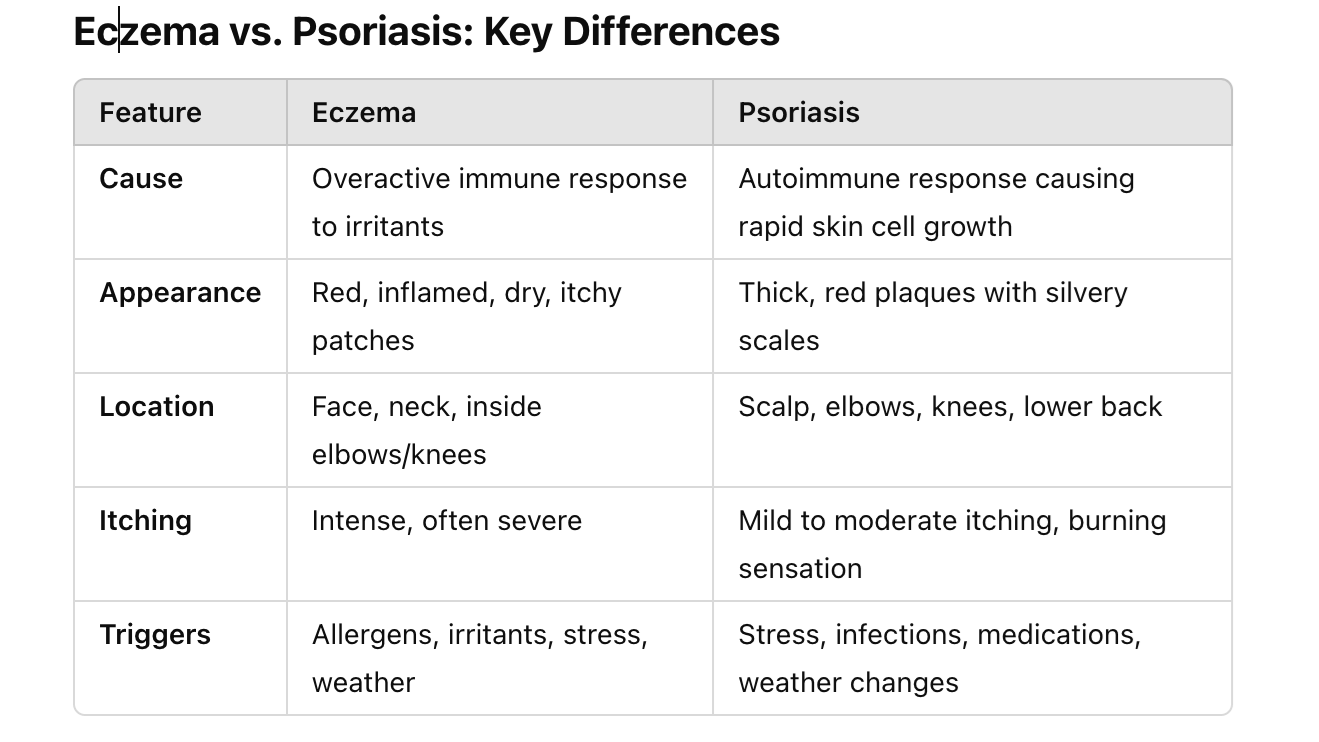Eczema vs. Psoriasis: How to Tell the Difference and Get Relief Fast!
3/17/2025
Eczema vs. Psoriasis: How to Tell the Difference and Get Relief Fast!
If you’re struggling with itchy, inflamed skin, you might be wondering: Is it eczema or psoriasis? While both conditions can cause red, scaly patches, they are distinct skin disorders with different triggers, symptoms, and treatments. Identifying the right condition is crucial to getting effective relief. If you live in Bedford, TX or the Dallas-Fort Worth metroplex don't hesitate to contact us today, as understanding the key differences between eczema and psoriasis can help you seek the right dermatological care.
What Is Eczema?
Eczema, also known as atopic dermatitis, is a chronic skin condition characterized by inflammation that leads to dry, itchy, and irritated skin. It often starts in childhood but can persist into adulthood or develop later in life. Eczema is part of a group of conditions that include asthma and hay fever, and it’s commonly linked to an overactive immune response.
Common Symptoms of Eczema:
- Intense itching (often the first sign)
- Dry, scaly skin
- Red, inflamed patches
- Oozing or crusting in severe cases
- Thickened skin from chronic scratching
- Commonly affects the face, neck, front of the elbows, back of the knees, and hands
What Is Psoriasis?
Psoriasis is an autoimmune skin condition where the immune system triggers rapid skin cell turnover, leading to the buildup of thick, scaly patches known as plaques. Unlike eczema, psoriasis is can be associated with systemic inflammation and can affect the joints (psoriatic arthritis) in some individuals.
Common Symptoms of Psoriasis:
- Thick, raised red patches with silvery-white scales
- Itching, burning, or soreness
- Dry, cracked skin that may bleed
- Nail changes (pitting, discoloration, thickening)
- Often found on the scalp, elbows, knees, lower back, and nails
&srotate=0)
This table shows the key differences between Eczema (Atopic Dermatitis) and Psoriasis
How to Tell If You Have Eczema or Psoriasis
While both conditions share some overlapping symptoms, a few clues can help you distinguish between them:
- Itch Intensity: Eczema typically causes more intense itching than psoriasis.
- Appearance: Eczema often looks red and inflamed with dry, flaky skin, while psoriasis presents as thick, scaly plaques with a silvery sheen.
- Location: Eczema commonly appears in skin folds (like the inner elbows), while psoriasis often affects the scalp, knees, and elbows.
- Triggers: Eczema flares are usually triggered by allergens, irritants, or environmental changes, while psoriasis can be triggered by stress, infections, or certain medications.
If you're unsure, it’s best to consult a dermatologist in Dallas-Fort Worth, TX for an accurate diagnosis.
Getting Relief: Eczema Treatment Options
Managing eczema requires a combination of daily skincare and medical treatments:
- Moisturizers: Use fragrance-free, thick creams to lock in moisture.
- Topical Steroids: Reduce inflammation during flare-ups.
- Antihistamines: Help control itching, especially at night.
- Prescription Medications: For severe cases, topical calcineurin inhibitors or systemic treatments like biologics may be prescribed.
- Lifestyle Changes: Identify and avoid triggers (allergens, harsh soaps, extreme temperatures).
For personalized eczema treatment in Bedford, TX, visit our board-certified dermatologist to ensure you receive tailored care.
Getting Relief: Psoriasis Treatment Options
Psoriasis treatment focuses on slowing skin cell growth and managing inflammation:
- Topical Treatments: Steroid creams, vitamin D analogs, and coal tar products.
- Phototherapy: UV light therapy to reduce inflammation and slow skin cell turnover.
- Systemic Medications: Oral drugs like methotrexate or biologic injections targeting the immune system.
- Lifestyle Adjustments: Stress reduction techniques, a healthy diet, and moisturizing regularly.
If you’re experiencing symptoms of psoriasis in the Dallas-Fort Worth area, consulting with a dermatologist can provide access to advanced treatments, including biologics and phototherapy.
When to See a Dermatologist in Bedford, TX
While mild cases of eczema or psoriasis might be managed at home, it’s important to seek professional care if:
- Your symptoms are severe, painful, or widespread
- Over-the-counter treatments aren’t effective
- Your skin shows signs of infection (pus, yellow crusting, fever)
- You have joint pain, which could indicate psoriatic arthritis
- The condition is affecting your quality of life or mental health
At Essential Dermatology Group in Bedford, TX, our board-certified dermatologists specialize in diagnosing and treating complex skin conditions like eczema and psoriasis. We offer personalized treatment plans to help you find lasting relief.
Why Choose Essential Dermatology Group in Bedford, TX?
- Expert Care: Board-certified dermatologists with experience in managing chronic skin conditions.
- Advanced Treatments: Access to cutting-edge therapies, including biologics, phototherapy, and patch testing.
- Patient-Centered Approach: Customized care plans tailored to your specific skin needs.
- Convenient Location: Serving patients across Bedford and the greater Dallas-Fort Worth metroplex.
Final Thoughts
Distinguishing between eczema and psoriasis is key to finding the right treatment and achieving healthier skin. Both conditions can significantly impact your life, but with proper diagnosis and management, you can control symptoms and improve your quality of life.
If you’re struggling with persistent skin issues, don’t wait. Schedule an appointment with Essential Dermatology Group in Bedford, TX today to get expert care and start your journey to clearer, healthier skin.
Book your consultation now at www.edermgroup.com or call us to learn more!